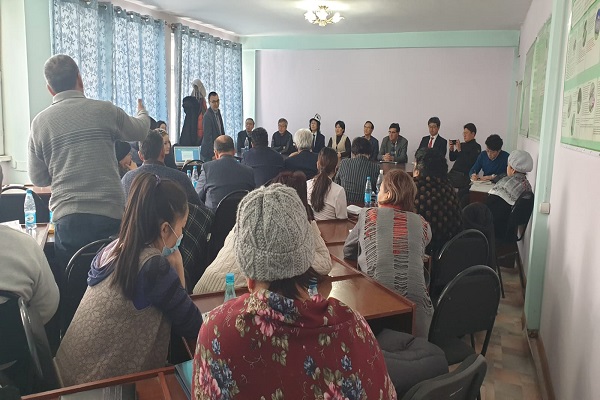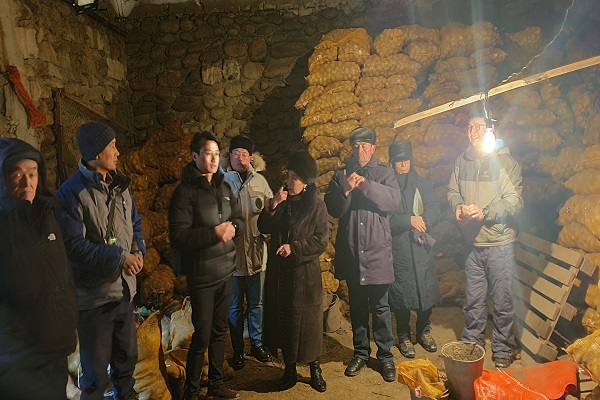

Korea Institute for Development Strategy(KDS) dispatched a Project Management Office (PMO) team (Project Manager, Project Management Team Manager and Officer) and sector experts (Organic Farmland - Soil Management, Post-harvest management and Infrastructure, Organizing Organic Agriculture and Training Program Development) to Bishkek and Issyk-kul region in the Kyrgyz Republic for fourteen days, from 15-28 January with the purpose of conducting the 2nd kick-off survey for "Organic Agriculture Policy-Implementation Support and Capacity Building Project" in the Kyrgyz Republic.
The main objectives of the survey were to confirm and launch project implementation unit (PIU) and project steering committee (PSC), consult on planning the organic experts' Training of Trainer (ToT) program and invitational training for establishment of institutional foundation, identify status of organic agricultural production technologies and value chain, investigate local performance research institutes and specify the operational and management plans for field office.
The launching event for confirming and establishing the PSC and PIU among four parties (KOICA-KDS-Ministry of Agriculture, Food Industry and Melioration (MoAFIM)-FAO) was held on 25 January. The Minister and Deputy Minister of MoAFIM attended the event and signed the Minutes of Meeting (MM) with representatives from KOICA and KDS. The MM included the following contents: tasks of Project Management Contractor (PMC), quarterly plans for 2020 and configuration and role of PSC and PIU. The Deputy Minister of the Ministry, Country Director of KOICA Kyrgyzstan Office, Project Manager of PMC and the representative of FAO are the members of PSC and will be reported about the progress and performance of project. As members of PIU, the Head of Department of Organic Agriculture Development, Chief of Agriculture, Seed and Organic Department in the Ministry, Regional Director of Agro-bio Center in Issyk-kul region, Director of Department of Regional Development in Issyk-kul Oblast Government, Project Leader of PMC and Plant Production and Protection Officer in FAO would undertake the actual practices in the project.
With the Minister's full support and interest in the project, the role and activities of PSC and PIU were discussed during the event. In addition, the Minister expressed his strong willingness to support establishing an active discussion system on major issues in the project.
PMO and sector experts also visited and interviewed the stakeholders in the Department of Organic Agriculture Development, Issyk-kul Oblast Government and three pilot villages (Teplokluchenka, Maman, and Tosor). They have established specific implementation plans by visiting local farms using organic farming methods and carefully checking the current status of each commodity and infrastructure. Moreover, they conducted the round-table conference with cooperative leaders and members in pilot project sites, gathering the information on organic value chain development status, organic producer-consumer organization, sales and distribution. Thus, they comprehensively recognized the necessity of carrying out a multifaceted survey on the project sites and continuous meetings with farmers.
A training program development sector expert, Konrad Haupfleisch, from the International Federation of Organic Agriculture Movements (IFOAM Organics International), joined the discussion on developing the Organic ToT program and its curriculum. This program will enable public officials in organic related departments and regional leaders in pilot sites to have easy access to organic certificate, policy and market information.
The organic seminar with DOAD was held to understand the educational needs of invitational training program on establishment of institutional system. During the seminar, the public officials from DOAD and seven regional directors from each regional Agro-bio Center also had a chance to learn about the Korea's development experience and lesson of organic agriculture policy, major components of this project, best practices of value chain development of organic agriculture in Korea (Hansalim) and the opportunity and future of organic agriculture in Kyrgyz Republic in the knowledge and experience sharing session. Additionally, PMO and sector experts were able to gain the information on the organizational structure and job description of DOAD, which are essential for designing the invitational training program for capacity development of public officials in the DOAD.
Before taking a step forward, it is meaningful to solidify networks among various stakeholders and to establish a working group for implementing activities and monitoring performance of this project by launching PSC and PIU. Therefore, it helps the PMO and sector experts to specify the direction and implementation plans for this project.
Aiming to increase the income of farming households by establishing infrastructure and enhancing the marketability of organic agriculture, KDS will conduct the following activities, such as △ Invitational training program for creation of the legal environment, △ Operation of capacity building training program to strengthen organic practice, △ Establishment of organic value chain.
***KDS will open the field office in February, and implement invitational training program for establishment of institutional foundation of Organic law and conduct on-site kick-off meeting for stakeholders in project sites in June, 2020.